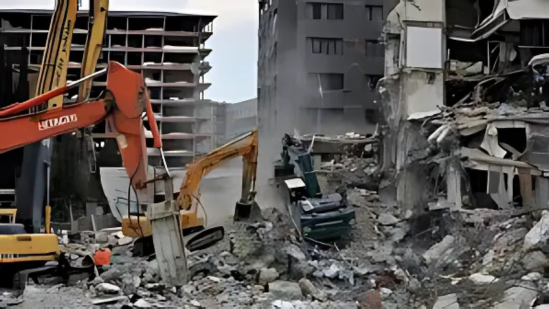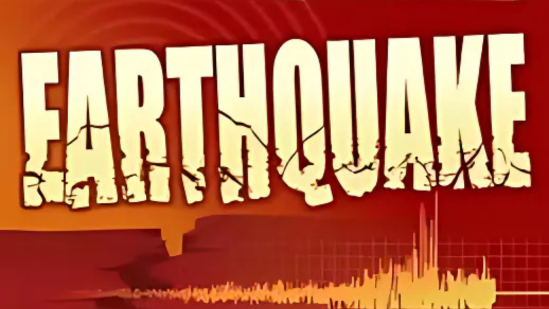
A powerful earthquake of magnitude 5.8 struck the popular coastal town of Marmaris in southwestern Turkey, leaving one person dead and injuring dozens more. The earthquake hit on Monday evening, causing panic among residents and tourists in the region. According to Turkey’s Disaster and Emergency Management Authority (AFAD), the quake’s epicenter was located near Marmaris in the Mugla Province, and tremors were felt in neighboring towns and cities.
The earthquake struck at a depth of 8.5 kilometers, making it a relatively shallow event. Shallow earthquakes tend to cause more damage on the surface due to their proximity to the Earth’s crust. According to local officials, many buildings shook violently, and people ran out into the streets, fearing for their lives.
The victim who died was identified as a 62-year-old man who reportedly suffered a heart attack during the quake. Emergency responders said at least 45 others were injured, some due to falling debris and others while trying to flee buildings. Most of the injuries were minor, but a few people remain in critical condition and are being treated in nearby hospitals.
Rescue operations were quickly launched by local emergency teams. Search and rescue dogs, paramedics, and firefighters were deployed to check for people trapped under debris. Fortunately, no large-scale building collapses have been reported, although several homes and older structures suffered visible cracks and damage.
The quake triggered short-term power outages in some areas of Marmaris and nearby districts. Utility workers have since restored electricity to most regions, but inspections are still ongoing to ensure that power lines and gas pipelines remain safe. Schools have been temporarily closed, and some roads were blocked due to fallen rocks and debris.
AFAD officials warned residents to stay alert for aftershocks, which often follow a major quake. As of Tuesday morning, at least 12 aftershocks had been recorded, with magnitudes ranging between 2.5 and 4.1. People were advised to stay away from damaged buildings and avoid using elevators until further notice.
Marmaris, a popular tourist destination on the Aegean coast, sees thousands of visitors each year. Many tourists were staying in hotels when the earthquake struck. Some described the experience as terrifying. “The whole room shook, and we didn’t know what to do,” said a tourist from Germany. Hotel staff guided guests to open areas and beaches to ensure their safety.
Local government and municipal bodies have set up emergency shelters and tent camps in open areas such as parks and school grounds for those whose homes were damaged. Free food, blankets, and medical aid are being provided to affected families. Volunteers and humanitarian organizations have also joined hands to help with relief efforts.
President Recep Tayyip Erdoğan expressed condolences to the family of the deceased and promised full government support for those affected. In a statement, he said: “Our hearts go out to the people of Marmaris. Necessary steps are being taken to ensure everyone’s safety, and we will not rest until life returns to normal.”
Turkey is located on several active fault lines, making it one of the most earthquake-prone countries in the world. In recent years, the country has experienced multiple devastating earthquakes, including the 2023 Kahramanmaras earthquake that killed over 50,000 people. This latest quake, while less destructive, is a reminder of the seismic risks the region continues to face.
Geologists and seismic experts have been monitoring the area for signs of further activity. According to the Kandilli Observatory and Earthquake Research Institute, the Marmaris earthquake was caused by a strike-slip fault movement, which is common in western Turkey. Experts are currently analyzing the data to predict whether larger quakes could follow.
Residents in the region are being urged to prepare emergency kits, learn safety drills, and follow updates from local authorities. Schools and offices have been conducting safety training, and public buildings are undergoing inspections to check structural integrity.
Neighboring countries such as Greece and Cyprus also reported mild tremors but no significant damage or casualties. International leaders, including from the European Union and the United Nations, have extended support and offered aid if needed.
Social media has been flooded with videos and images of shaking buildings, terrified people rushing outside, and the immediate aftermath of the quake. Many users used the hashtag #TurkeyEarthquake to share information, seek help, and stay connected.
The 5.8 magnitude earthquake in Marmaris has left one person dead and dozens injured, but swift action by emergency services has helped avoid a larger tragedy. The government, along with humanitarian groups, continues to support affected families, and experts remain vigilant in monitoring seismic activity. The people of Marmaris now face the challenge of rebuilding and recovering from yet another natural disaster.































